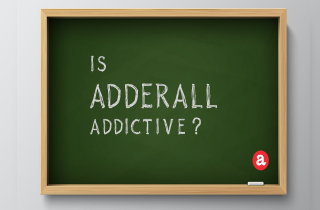YES. Adderall is addictive.
What makes Adderall addictive? Euphoric effect, or an extreme sense of well-being. But how Adderall works is different for those diagnosed with attention disorders than for addicts. Here, we review what you need to know if you think you’re an Adderall addict. And we invite your questions about the addictive potential of Adderall at the end.
What is Adderall used for?
Adderall is a prescription stimulant medication used to treat ADHD and narcolepsy. Adderall comes in tablet form, and in either immediate release or extended release versions. When taken as prescribed, Adderall can offer relief from symptoms throughout the day. But when you take Adderall to try to get high or are snorting Adderall XR, Adderall can become addictive.
What is Adderall made of?
The active ingredients in Adderall are synthetic substances, created in a lab. Adderall is made of the stimulants amphetamine and dextroamphetamine. These powerful stimulant drugs are related to the illicit drug methamphetamine.
So how can Adderall get you high? Amphetamines disrupt normal communication between brain cells and increase levels of the neurotransmitter dopamine in the central nervous system. The excess dopamine can produce a feeling of euphoria. Although normal, prescribed medical use of Adderall does not trigger this reaction in most people, the effect can be experienced by people without attention or sleep disorders.
How addictive is Adderall?
Adderall is very addictive in people who don’t have ADHD. Adderall’s strong effects on the central nervous system cause it to be frequently abused. And although it’s illegal to use Adderall without a doctor’s prescription, people use Adderall to enhance performance or to feel an intense sensation of well-being.
Adderall dependence vs. addiction
Adderall dependence is not necessarily the same as Adderall addiction. Someone using Adderall to treat an attention disorder may not be able to function without the medication, or may experience withdrawal effects if they stop taking it. But this isn’t the same as an addition – an addiction involves a psychological compulsion to seek out the drug, even when it has negative effects on the addict’s personal or professional life.
How do you get addicted to Adderall?
Are you taking Adderall for a medically-diagnosed disorder? If you’re taking Adderall as directed by your doctor, you probably won’t form an addiction to Adderall. In fact, it’s far less likely that you’ll get addicted to Adderall this way. However, if you increase doses or frequency of use, or enjoy the focused concentration you get while on Adderall, your chances of developing an addiction increase.
In general, you can get addicted to Adderall if you take it in a manner other than normally prescribed. If you make a conscious decision to misuse Adderall, it’s very likely you’ll become addicted. Some ways that people misuse and abuse Adderall are when they:
- chew Adderall to prevent controlled release
- crush Adderall into a powder and snorting Adderall
- crush Adderall to dissolve in water and inject
- take Adderall in higher doses than prescribed
- take Adderall more frequently than prescribed
Finally, it’s worth keeping in mind that you’re at a higher risk of Adderall addiction if you’ve been addicted to other drugs or alcohol in the past.
Signs of Adderall addiction
Adderall dependence and addiction can be hard to tell apart. Both may manifest characteristics of tolerance and withdrawal. However, an Adderall addiction involves intense cravings for the drug and the feeling that the user can’t go without it. In other words, you may be addicted to Adderall if you need to take it to deal with normal stresses in daily life. Other signs of Adderall addiction include:
- Continued Adderall abuse despite negative consequences to your social, financial or physical livelihood.
- Craving Adderall and using it compulsively.
- Seeking Adderall in order to stimulate the “reward center” of the brain.
Adderall addiction potential questions
Do you still have questions about the addiction potential of Adderall? Please leave your questions, comments or feedback here. We are happy to help answer your questions personally and promptly. And if we do not know the answer to your particular Adderall question, we will refer you to someone who does.









Related Posts